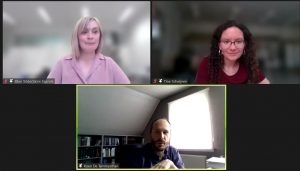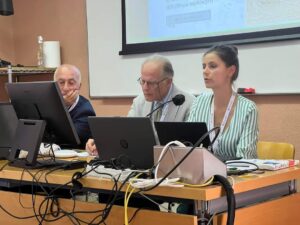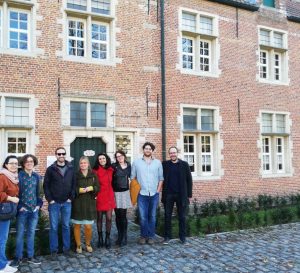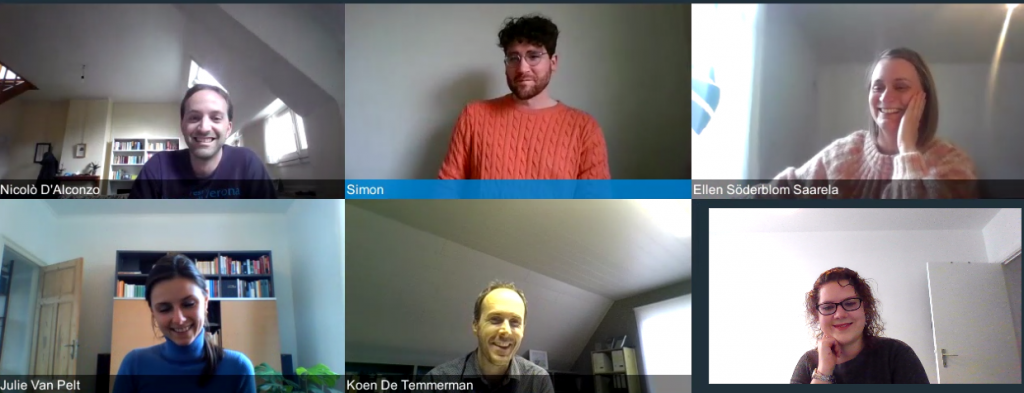Our research group is very active in disseminating its research findings to audiences within and beyond academia.
Organization of workshops and conferences

Previous events:
- U4/Enlight Ancient World Winter School on “The Old and the New: Tradition and Innovation in Antiquity”, organized by Julie Van Pelt and Dimitri Van Limbergen in March 2023.
- Workshop on ‘The reuse of ancient and late antique narratives in the medieval Middle East and beyond‘, organized by Mara Nicosia in January 2023.
- OIKOS-workshop on The politics of style in ancient rhetoric and oratory, organized by Thierry Oppeneer in December 2022.
- Workshop on Ancient Concepts of Fiction and Narrative in the Imperial Period and Late Antiquity: Fiction Across Boundaries, coorganized by Claire Rachel Jackson and Nicolò D’Alconzo in November 2022.
- The sixth International Conference on the Ancient Novel. From 21st till 24th September 2022, we hosted ICAN VI in Ghent.
- Workshop on Fiction in Transition: Ancient concepts of Fiction and Narrative in the imperial period and late antiquity, coorganized by Claire Rachel Jackson and Nicolò D’Alconzo in February 2022.
- Conference on Enchanted Reception: Religion and the Supernatural in medieval Troy narratives, coorganized by Tine Scheijnen and Ellen Söderblom Saarela in June 2021.
- Online seminar series on Novel Echoes: Ethiopian and Babylonian Stories in Byzantium and Beyond, organized by Koen De Temmerman between March and June 2021.
- Conference on The Pseudo-Clementine Homilies: a philosophical and rhetorical novel from Late Antiquity, coorganized by Benjamin De Vos, Danny Praet, and Koen De Temmerman in February 2021.
- Workshop on The Tale of Two Traditions. Roman culture and Ancient Greek narratives under the Principate, organized by Olivier Demerre in May 2020.
- Guest lecture by Herman Van Rompuy on Rhetorics in the political arena, organized by Koen De Temmerman in December 2019.
- Work-in-progress workshop on Speeches by the OIKOS Ancient Rhetoric and Aesthetics research group in June 2019.
- Colloquium on Rhetoric and morality by the OIKOS Ancient Rhetoric and Aesthetics research group in December 2018.
Recent and upcoming conference papers by group members
- Julie Van Pelt (July 2025): ‘Intertextuality and Open Texts: the Life of Makarios the Roman and the Greek Alexander Romance’, Conference ‘Intertextuality in Byzantine Literature’, Cologne.
- Nicolò D’Alconzo (July 2025): ‘The ancient novels in Byzantium: intertextuality and reception’, Reading through the Lines: Variations and Functions of Intertextuality in Byzantine Literature, Universität Köln.
- Camila de Moura (July 2025): ‘The Death of Euripides and the Pattern of Poetic Sparagmos: A Study in Biographical Fiction’. 17th Congress of the FIEC, University of Wrocław, Poland.
- Anna Athanasopoulou (July 2025): ‘Chromatic reverberations: the prismatic ecology of Nonnus’ Dionysiaca’. Classical Association Conference, St Andrews.
- Julie Van Pelt (May 2025): ‘Trans Sainthood and Metaphrasis: Rewriting Gender in the Metaphrastic Life of Theodora/-us of Alexandria (BHG 1730)’, Conference ‘Trans Sainthood in Translation’, London.
- Anna Athanasopoulou (April 2025): ‘The ecology of colour’. Ecocriticism Reading & Working Group, Ghent University.
- Julie Van Pelt (April 2025): ‘Van martelaar tot ‘mulier virilis’: Religie, gender en vrouwelijke heiligheid in de Late Oudheid’, NKV Oost-Vlaanderen.
- Nicolò D’Alconzo (March 2025): ‘ “…εἰς τὸ Βυζάντιον.” Achilles Tatius travels’, Symposium on Ancient Narrative and its Reception: a Tribute to Prof. Saiichiro Nakatani (1972-2023), Ghent University.
- Anna Athanasopoulou (March 2025): ‘Weirding the earth with Lucian’, LSW, Ghent University.
- Anne Lanckriet (March 2025): ‘Reality, Representation, and Reputation. Navigating Group Identity and Personal Professional Practice in Alciphron’s Letters of Hetairai‘, Rome.
- Julie Van Pelt (February 2025): ‘In Search of the Extraordinary: Monks and Miracles as Paradoxa in the Greek Historia Monachorum in Aegypto’, Conference ‘In Search of Holiness: The Beginnings and Development of Monastic Hagiography in Late Antiquity’, Leuven.
- Benjamin De Vos (September 2024): ‘Joodse, Christelijke en Joods-Christelijke filosofie in de klassieke oudheid en laatantieke oudheid’, Studiedag CC Scharpoord, Knokke.
- Nicolò D’Alconzo (September 2024): ‘People as gardens: proleptic ekphrasis between fiction and history’, PONTES XI, Universität Freiburg.
- Benjamin De Vos (August 2024): ‘The Role of the True Prophet in the Pseudo-Clementines: From Neoplatonic Philosophy to Islamic Revelation’, EASR, Gothenburg.
- Benjamin De Vos (August 2024): ‘In search of Plato’s view on the Soul in the Pseudo-Clementine Recognitions (Rec. 8.28-32)’, XIX International Conference on Patristics Studies, Oxford.
- Nicolò D’Alconzo (July 2024): ‘Achilles Tatius makes the wor(l)d: springs, gardens, and the fluidity of genres’, CCC, Cardiff University.
- Nicolò D’Alconzo (July 2024): ‘Ekphrasis transformed, novel rewritten: Pseudo-Nikolaos’ model progymnasmata and Achilles Tatius’, ISHR, University of British Columbia, Vancouver.
- Benjamin De Vos (June 2024): ‘What does it mean to be ‘Ἕλλην’? The Role of Mattidia in the Greek Pseudo-Clementines and its Metaliterary Reflections on Greek Identity’, Centre “Beyond Canon___”, Regensburg Universität (prof. Tobias Nicklas).
- Claire Rachel Jackson (May 2024). ‘Forgery, Falsehood and Fiction in the Letters of Phalaris’. Crafting a Lie: Forgeries in the Classical Tradition, Sapienza Università di Roma.
- Benjamin De Vos (April 2024): ‘Chaos en orde in de Kosmos: (Zelf)reflecties van Herakleitos en andere Ionische filosofen’, Dag van de Filosofie, Ghent Kask & Conservatorium.
- Julie Van Pelt (April 2024): ‘Van martelaar tot ‘mulier virilis’: Religie, gender en vrouwelijke heiligheid in de Late Oudheid’, NKV West-Vlaanderen.
- Nicolò D’Alconzo (April 2024): ‘Sklerena the heroine, Psellos the novelist?’, Fiction and Faction in Byzantine Literature, Fifth Byzantine Colloquium of the University of Buenos Aires.
- Benjamin De Vos (March 2024). ‘Het Duivelspact als een streven naar kennis: van het vroege Christendom tot de Verlichting’, Ifese – Instituut voor Filosofische en Sociaalwetenschappelijke Educatie.
- Claire Rachel Jackson (March 2024). ‘River of Deceit: Water, Truth, and Fiction in Achilles Tatius’ Leucippe and Clitophon’. Classical Association Conference 2024, University of Warwick.
- Claire Rachel Jackson (March 2024). ‘Imaginary Women/The Female Imaginary: Aristaenetus’ Love Letters and Ancient Novelistic Fiction’. Classical Association Conference 2024, University of Warwick (panel co-organiser “To Whom It May Concern: Female Addressees in Ancient Epistolography”).
- Claire Rachel Jackson (February 2024). ‘From Heroes to Saints: Leucippe and Clitophon, the Lives of Galactionand Episteme, and Novel Receptions in Medieval Hagiography,’. University of Missouri.
- Julie Van Pelt (January 2024): ‘A Christian Paradoxography: Humans, Animals, and Monsters in the Life of Makarios the Roman’, SCS Annual Meeting, Chicago.Benjamin De Vos (December 2023): ‘Staging Peter in the Pseudo-Clementine Recognitions’, at the conference Staging Early Christianities (King’s College London).
- Julie Van Pelt (November 2023): ‘Narrating Voice in Religious Narrative: Examples for a Flexible Enunciation Model’, Workshop ‘Religious Narrative in Ancient, Medieval and Modern Literary Cultures’, Amsterdam.Benjamin De Vos (November 2023): ‘Irony and Dissimulatio in the Pseudo-Clementines’, at the International Meeting of the Society of Biblical Literature (San Antonio [TX]).
- Claire Rachel Jackson (November 2023): ‘From Heroes to Saints: Leucippe and Clitophon, the Lives of Galaction and Episteme, and Novel Receptions in Christian Hagiography’. Harvard Department of Classics.
- Benjamin De Vos (November 2023): ‘A Disabled Saint and true Beauty: The Voice of Mattidia in the Pseudo-Clementine Homilies’, at the International Meeting of the Society of Biblical Literature (San Antonio [TX]).
- Nicolò D’Alconzo (November 2023): ‘Women of fiction. The heroines of the ancient Greek novels and their Byzantine readers’, Griekenlandcentrum, Ghent University.
- Nicolò D’Alconzo (November 2023): ‘Visual and written fictions: Venus-statues and Callirhoe’, Les arts du roman grec, journée d’études Université de Pau.
- Benjamin De Vos (November 2023): Book Presentation and Review Panel (Response) for ‘Benjamin M. J. De Vos and Danny Praet, In Search of Truth in the Pseudo-Clementine Homilies. New Approaches to a Philosophical and Rhetorical Novel of Late Antiquity, Tübingen: Mohr Siebeck, 2022’, at the International Meeting of the Society of Biblical Literature (SBL; Panel Section – Jewish Christianity and Christian Judaism; San Antonio [TX]).
- Benjamin De Vos (October 2023): ‘Van Simon de Magiër tot Simon de Sofist in de Pseudo-Clementijnse Homilieën’, The Stichting Oudchristelijke Studiën (Amersfoort).
- Benjamin De Vos (October 2023): ‘Het duivelspact in het vroege christendom’, Lectures of the Center for the Study of the Christian Traditions (CSCT) on ‘The Devil: a History’.
- Benjamin De Vos (October 2023): ‘De Pseudo-Clementijnse Roman: Op Zoek naar Waarheid’, Stichting Oudchristelijke Studiën (Amersfoort).Julie Van Pelt (September 2023): ‘Cross-dressing, Imitatio Theclae and Adaptatio Theclae’, 2nd International Conference on Early Christian Literature, Late Antique and Byzantine Hagiography – Imitationes Christi and Women Martyrs, Valencia.
- Benjamin De Vos (September 2023): Keynote ‘Einführung: Grundprobleme der Pseudoklementinischen Literatur – A Status Quaestionis of Pseudo-Clementine Scholarship,’ Internationale Sommer-Werkstatt ‘(Pseudo-)Klementinische Literatur (Georg-August-Universität Göttingen/Universität Bern/Reinhausen, Heiligkreuztal; invited by Prof. dr. Ilinca Tanaseanu-Döbler and prof. Prof. Dr. Rainer Hirsch-Luipold).
- Julie Van Pelt (September 2023): ‘Cross-dressing, Imitatio Theclae and Adaptatio Theclae’, Second International Conference on Early Christian Literature, Late Antique and Byzantine Hagiography, Valencia.
- Benjamin De Vos (September 2023): ‘From Technician to Doctor: God and the composition of Evil in the Pseudo-Clementines’ – Panel 0P61: New panel No 5. Analysing Written Texts: Christianity, EASR (Vilnius).
- Nicolò D’Alconzo (July 2023): ‘Visual culture and the Greek and Roman novels: Venus-statues, Callirhoe, and Psyche’, Celtic Classics Conference, Coimbra.
- Nicolò D’Alconzo & Koen De Temmerman (July 2023): ‘Introducing the Novel Echoes Database of References to the Ancient Novels, 200-1200’, International Medieval Congress, Leeds.
- Julie Van Pelt (July 2023): ‘Punishing Magicians through Miracle: The Motif of Trial by Fire in Greek Hagiography’, International Medieval Congress, Leeds.
- Benjamin De Vos (July 2023): ‘Spaces of Paideia and the Public Eye in the Pseudo-Clementines’, International Conference Colloquium Biblicum Lovaniense (CBL): Early Christianity in Civic Space (Leuven, KUL).
- Claire Rachel Jackson (May 2023) ‘The Prudish Middle Ages? Byzantine Receptions of Ancient Erotic Literature/De preutse Middeleeuwen? De receptie van antieke erotische literatuur in Byzantium’, co-presentation with Floris Bernard, Verboden Boeken seminar series, Ghent University.
- Julie Van Pelt (May 2023): ‘Magic and Magicians in Greek Hagiography’, 1st EJCM conference, Venice.
- Benjamin De Vos (May 2023): ‘A New Perspective on the Pseudo-Clementine Homilies as a Philosophical Novel’. NASSCAL (North-American Society for the Study of Christian Apocryphal Literature) First Friday Workshop.
- Claire Rachel Jackson (April 2023) ‘“A Beauty Not Human But Divine”: Wonder, Belief, and Fiction in Chariton’s Callirhoe and its Early Reception,’ Classical Association Conference 2023, University of Cambridge. (programme link here)
- Nicolò D’Alconzo (March 2023): ‘Talkin ‘bout my generation”: old vs. new in antiquity‘, U4/Enlight Ancient World Winter School.
- Benjamin De Vos (March 2023): ‘Understanding the Pseudo-Clementine Homilies as a late antique, philosophical novel’, University of Ottowa.
- Claire Rachel Jackson (February 2023) ‘Chariton’s Callirhoe, Musaeus’ Hero and Leander, and Late Antique Receptions of the Ancient Novel’, Cambridge Late Antique Seminar Network Seminar Series (CLANS), University of Cambridge. (programme link here)
- Benjamin De Vos (February 2023): ‘Understanding the Pseudo-Clementine Homilies as a Late Ancient, Philosophical Novel’, Departmental Lectures Series at uOttawa (Département d’études anciennes et de sciences des religions).
- Julie Van Pelt (January 2023): ‘Real and Unreal Wonders: Magic, Realism and Fiction in the Life of Jason and Sosipatros’, Workshop: Realism in Hagiography, Cologne.
- Benjamin De Vos (January 2023): ‘Living philosophy in the Pseudo-Clementine narrative’, l’Association pour l’étude de la littérature apocryphe chrétienne, Bex.
- Mara Nicosia (December 2022): ‘Una tenace eredità: influenze greche in siriaco in epoca abbaside’, workshop L’eredità di Bisanzio, Naples.
- Benjamin De Vos (December 2022): ‘Discussing and solving Evil in the Pseudo-Clementines – In Search of the True Christian Philosopher-Doctor?’ International Conference ‘Networking through Biography’ (Leuven, LECTIO).
- Julie Van Pelt (November 2022): ‘Thecla, Christian Model of Womanhood’, Seminario de Literatura Griega Cristiana, Valencia.
- Benjamin De Vos (November 2022): ‘The Moral and Metaliterary Depth of Mattidia’s Role in the Pseudo-Clementines: Christian Fiction and the ‘Dehellenization’ of the Novel?’, International Workshop Ancient Concepts of Fiction and Narrative in the Imperial Period, Late Antiquity, and Byzantium, Ghent University.
- Nicolò D’Alconzo (November 2022): ”Worked out with precise resemblance”. The Life of Athanasius the Athonite and the Greek novels’, Lampeter CA Seminar Series.
- Tine Scheijnen (October 2022): ‘Women in the Trojan War. Gender evolutions across the ancient Greek and medieval vernacular literary traditions’, Conference Ancient Rape Cultures: Greek, Roman, Jewish, and Christian, Rome.
- Tine Scheijnen (September 2022): ‘Wild Women and Heroic Power: Modern Perspectives on Late Antique and Medieval Women in the Trojan War’, Epic Heroism in Late Antiquity Conference, Lisbon.
- Julie Van Pelt (September 2022): ‘The Life of Makarios the Roman between History and Fiction’, Conference: ICAN VI, Ghent.
- Nicolò D’Alconzo (September 2022): ‘Callirhoe in Byzantium’, ICAN VI Conference, Ghent University.
- Claire Rachel Jackson (September 2022): ‘Obscenity, chastity, and fiction: novel receptions in Photius’ Bibliotheca’, ICAN VI Conference, Ghent University.
- Koen De Temmerman (September 2022): ‘Callirhoe and Euphemia’, ICAN VI Conference, Ghent University.
- Simon Ford (September 2022): ‘Anonymity and fiction in John of Ephesus’ Lives of the Eastern Saints’, ICAN VI Conference, Ghent University.
- Benjamin De Vos (September 2022): ‘The Pseudo-Clementines: Christian Fiction and the ‘Dehellenization’ of the Novel?’, ICAN VI Conference, Ghent University.
- Mara Nicosia (September 2022): ‘Greek novels in Syriac? The contribution of rhetorical teaching’, ICAN VI Conference, Ghent University.
- Julie Van Pelt (August 2022): ‘Journeys between history and fiction from ancient narrative to hagiography (and beyond): kunokephaloi and rescue by dolphin’, Conference: International Congress of Byzantine Studies, Venice/Padova.
- Julie Van Pelt (August 2022): ‘Direct speech in hagiography and secondary orality: questions and hypotheses’, Conference: International Congress of Byzantine Studies, Venice/Padova.
- Nicolò D’Alconzo (August 2022): ‘Drawing Leucippe and Clitophon: Europa (1.1), Philomela and Procne (5.3-5)’, Workshop: Research and Teaching Ekphrasis Through Creative Practice, Norwegian Institute in Rome.
- Julie Van Pelt (July 2022): ‘The Scribal Act as Gendering Act in the Byzantine Lives of ‘Cross-Dressing’ Saints’, Conference: International Medieval Congress, Leeds.
- Benjamin De Vos (June 2022): ‘Philosophy as Freedom? The Reception of Plato’s Myth of the Chariot in the Pseudo-Clementines’, EASR (Cork).
- Nicolò D’Alconzo (May 2022): ‘Psellos and the novels, from quotation to novelisation’, Workshop: Fictio. Ancient Concepts of Fiction and Narrative, Université de Lille.
- Benjamin De Vos (May 2022): ‘Philosophy as Freedom? The Reception of Plato’s Myth of the Charioteer in the Late Antique Pseudo-Clementine Corpus’, Annual Meeting of the North American Patristics Society (Chicago, hybrid format from Harvard University).
- Julie Van Pelt (May 2022): ‘Translating Religious Narrative: the Paradox of Impossible Necessity’, Workshop: Religious Narrative in Ancient and Medieval Literary Cultures, Odense.
- Claire Rachel Jackson (April 2022): ‘Chariton’s Callirhoe, Musaeus’ Hero and Leander, and Early Novelistic Receptions’, CA Conference, Swansea.
- Nicolò D’Alconzo (April 2022): ‘Novels in quotation culture: the case of Niketas Choniates’, CA Conference, Swansea.
- Julie Van Pelt (March 2022): ‘Niet applaudisseren alstublieft. Over theatervrees en performance in de byzantijnse periode’, Griekenlandcentrum, Ghent.
- Mara Nicosia (March 2022): ‘The Hellenistic Enkyklios Paideia in the Syriac world: the role of rhetoric in shaping the ‘classic”, PAIXUE, Edinburgh.
- Julie Van Pelt (February 2022): ‘Journeys Between History and Fiction: The Life of Makarios the Roman’, Workshop: Fiction in Transition, Ghent.
- Claire Rachel Jackson (February 2022): ‘Fiction, Plausibility, and Miracles in Gregory of Nyssa’s Life of Macrina’, Fiction in Transition workshop, Ghent.
- Mara Nicosia (January 2022): ‘Syriac monastic schools and the teaching of rhetoric‘, Centre for Research on Ancient Civilizations, Warsaw.
- Ellen S¨öderblom Saarela (December 2021): ‘Novels and potential of uncertainty: female desire in Theodore Prodromos’ Rhodanthe and Dosikles’, Fifth virtual meeting of the Argentine Committee of Byzantine Studies.

- Simon Ford (November 2021): ‘Telling Tales in Byzantine Palaestina: Late Antique Trickster Tales in the Medieval Samaritan Chronographic Tradition’, conference Storyworld in Collections: toward a Theory of the Ancient and Byzantine Tale, Centre for Medieval Arts & Ritual, University of Cyprus.
- Julie Van Pelt (September 2021): ‘Cyprian of Antioch between saint and magos: the Conversion (BHG 452) and the Confession (BHG 453)’, First International conference on Early Christian Literature, Late Antique and Byzantine Hagiography: Literary connections between the Apocryphal Acts of the Apostles and the Saints’ Lives, Valencia.
- Mara Nicosia (September 2021): ‘Syriac Rhetoric between Greek and Arabic: A Look at its History and Technical Vocabulary’, TeTra Joint Research Seminars, UGent.
- Julie Van Pelt (August 2021): ‘Believing the Unbelievable. Faith and Miracle-stories in Greek Hagiography from Late Antiquity’, Conference: EABS Annual Conference, Wuppertal.
- Mara Nicosia (July 2021): ‘Graeco-Aramaica: a look at Greek words in Christian Palestinian Aramaic’, International Online Workshop “Christian Palestinian Aramaic. Not quite the right ‘Syriac’”, Organized by Syriaca – Ricerche siriache
- Ellen Söderblom Saarela (June 2021): ‘Amazoneises, puceles corteises’: interpreting the Amazon’s Place in Courtly Romance’, Conference on Enchanted Reception (see above).
- Ellen Söderblom Saarela (April 2021): ‘She must write her self, she did write her self: Hysmine’s voice from within the wrong‘ (online seminar series Novel Echoes)
- Koen De Temmerman (March 2021): ‘A Life (not) to Die for: Eremitic Monasticism in Pseudo-Nilus’ Narrations‘, University of St Andrews, Classics Research Seminars.
- Koen De Temmerman (March 2021): ‘The Greek versions of the Miracle of Euphemia and the Goth: tragic and novelistic resonances’, University of California at Santa Barbara, Centre for the Study of Ancient Fiction workshop.
- Koen De Temmerman and Claire Rachel Jackson (December 2020): ‘Novel Echoes: Receptions of the Ancient Novel in Postclassical traditions‘ (Literature Department, UGent)
- Claire Rachel Jackson (December 2020): ‘Did the ancients read novels?‘, Griekenlandcentrum series.
- Ellen Söderblom Saarela (September 2020): ‘Responding to tradition’, Stockholm.
- Ellen Söderblom Saarela (June 2020): ‘La Dame Dido and Artemis from the Greek novel’, Uppsala, The World of the late Byzantine romance in context Conference.
- Julie Van Pelt (February 2020): ‘Miracle or Magic? The Figure of the Magos in Byzantine Hagiography’, Text and Transmission Research Seminar (TeTra), Leuven.
- Julie Van Pelt (January 2020): ‘Immersed in the Illusion: Pronoun-Shifts in Lives of Transvestite Saints’, Workshop: Enargeia and Immersion, Leiden.
- Olivier Demerre (October 2019): ‘Catching bodies, catching texts: Longus and Ovid on hunting‘, RICAN conference.
- Julie Van Pelt (November 2019): ‘Heliodoros the magician and the rhetoric of deception: creating religious authority through the figure of the magos’ (Regensburg University)
- Koen De Temmerman (October 2019): ‘Stories of Erotic Desire in Late Antique Hagiography: the Curious Case of Euphemia and the Goth (and Callirhoe)’, Swansea University, Kyknos Research Colloquium
- Koen De Temmerman (June 2019): ‘Too good to be true. Life-writing, love and desire in Greek Martyr Acts of Late Antiquity’, Universidade de Coimbra, Celtic Classics Conference
Blog posts

- Julie Van Pelt (April 2023): ‘History on repeat: tradition, innovation, and the Ancient World Winter School‘
- Claire Rachel Jackson and Mara Nicosia (December 2022): ‘All roads lead to novels: a brief account from the voices of two ICAN VI travellers’
- Mara Nicosia (April 2022): ‘Teaching Near Eastern rhetoric: the nostos of a BA class and its awkward teacher’
- Tine Scheijnen (February 2022): ‘Shame – and all the bad it can do, between Homer and now’
- Julie Van Pelt (December 2021): ‘On the reality and illusion of performance – from Broadway to Byzantium‘
- Nicolò D’Alconzo (November 2021): ‘Gods of montage: Sergei Eisenstein and Xenophon of Ephesos‘
- Claire Rachel Jackson (May 2021): ‘Reflection on the nature of ancient novels or My life before the Novel Echoes project‘
- Nicolò D’Alconzo (May 2021): ‘The Lykainion look: on two adaptations of Longus’ Daphnis and Chloe‘
- Mara Nicosia and Simon Ford (May 2021): ‘How the ERC changed our lives: the Syriacist’s perspective‘
- Julie Van Pelt (December 2020): ‘On academic mobility and the virtues of uncertainty (bis)‘
- Claire Rachel Jackson (November 2020): ‘Lockdown days, Arabian nights; Night 1‘
- Claire Rachel Jackson (November 2020): ‘Lockdown days, Arabian nights: Night 2‘
- Nicolò D’Alconzo (October 2020): ‘A very Frankensteinian business: on ancient films and ancient novels‘
- Tine Scheijnen (September 2020): ‘On the significance of details: Black Achilles medieval and modern‘
- Ellen Söderblom Saarela (June 2020): ‘Uncertainty’s potential: reading the new normal through Xenophon of Ephesus‘
- Claire Rachel Jackson (May 2020): ‘Photius, fiction, and the ancient novel‘
Schools workshop
Our research group has created a workshop for school pupils in Flanders in the final two years of secondary school.
Shipwreck, evil pirates, lovers reunited, and fake deaths. There are a number of prose texts from antiquity which tell exciting tales like this. They are usually love stories about a beautiful young boy and a beautiful young girl who go through lots of trouble before they get their happy ending. Think of Romeo and Juliet, but then without the deaths at the end. These texts are generally called ‘novels’, but are they really novels like those we read in the modern world? Who read these texts in antiquity – and why? In this workshop, we’ll have a closer look at some prose love stories from antiquity (Greek and/or Latin), and discuss what makes them a novel and what the texts tell us about the world in which they were written.
See here for more information and registration.
Other
- Koen De Temmerman (August 2019), ‘Na de stem – nu graag een heart-campagne‘, De Standaard.
